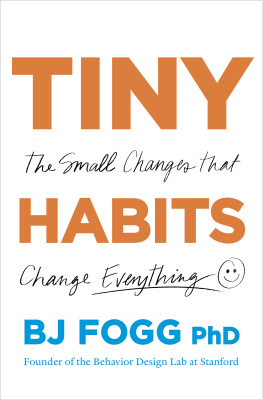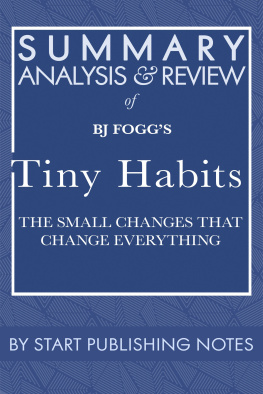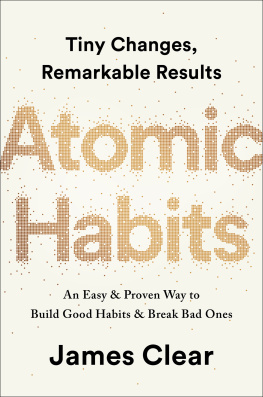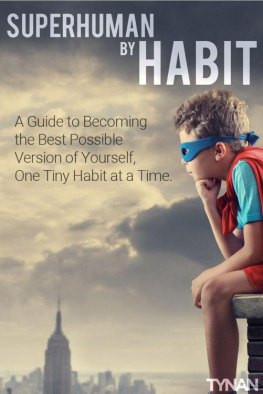

CONTENTS
ABOUT THE AUTHOR
BJ Fogg, PhD, founded the Behavior Design Lab at Stanford University. In addition to his research, Fogg teaches industry innovators how human behavior really works. He created the Tiny Habits Academy to help people around the world. He lives in Northern California and Maui.
For more about the author, see bjfogg.com.
To the wonderful people who inspired me to explore.
INTRODUCTION
Change Can Be Easy (and Fun)
Tiny is mighty.
At least when it comes to change.
Over the last twenty years, Ive found that most everyone wants to make some kind of change: eat healthier, lose weight, exercise more, reduce stress, get better sleep. We want to be better parents and partners. We want to be more productive and creative. But the alarming levels of obesity, sleeplessness, and stress reported by the media and seen in my Stanford labs research tell me there is a painful gap between what people want and what they actually do. The disconnect between want and do has been blamed on a lot of things but people blame it on themselves for the most part. They internalize the cultural message of Its your fault! You should exercise more, but you arent doing it. Shame on you!
I am here to say: It isnt your fault.
And creating positive change isnt as hard as you think.
For too many years, myths, misconceptions, and well-meaning but unscientific advice have set you up to fail. If youve attempted change in the past and havent seen results, you may have concluded that change is hard or that you cant succeed because you lack motivation. Neither is accurate. The problem is with the approach itself, not with you. Think of it this way: If you tried putting together a chest of drawers with faulty instructions and parts missing, you would feel frustrated. But you probably wouldnt blame yourself for this, would you? You would blame the manufacturer instead. When it comes to failed attempts at change, we almost never blame the manufacturer. We blame ourselves.
When our results fall short of our expectations, the inner critic finds an opening and steps on stage. Many of us believe that if we fail to be more productive, lose weight, or exercise regularly then something must be wrong with us. If only we were better people, we wouldnt have failed. If only we had followed that program to the letter or kept those promises to ourselves, we would have succeeded. We just need to get our act together and pull ourselves up by our bootstraps and do better. Right?
Nope. Sorry. Not right.
We are not the problem.
Our approach to change is. Its a design flaw not a personal flaw.
Building habits and creating positive change can be easy if you have the right approach. A system based on how human psychology really works. A process that makes change easier. Tools that dont rely on guesswork or faulty principles.
Popular thinking about habit formation and change feeds into our impulse to set unrealistic expectations. We know habits matter; we just need more good habits and fewer bad ones. But here we are, still struggling to change. Still thinking its our fault. All my research and hands-on experience tell me that this is exactly the wrong mindset. In order to design successful habits and change your behaviors, you should do three things.
+ Stop judging yourself.
+ Take your aspirations and break them down into tiny behaviors.
+ Embrace mistakes as discoveries and use them to move forward.
This may not feel intuitive. I know it doesnt come naturally to everyone. Self-criticism is its own kind of habit. For some people, blaming yourself is just where your brain goes its like a sled in the snow, slipping into a well-worn path down the hill.
If you follow the Tiny Habits process, youll start taking a different route. Snow will quickly start covering those self-doubting grooves. The new path will soon be the default path. This happens quickly, because with Tiny Habits you change best by feeling good not by feeling bad. The process doesnt require you to rely on willpower, or set up accountability measures, or promise yourself rewards. There is no magic number of days you have to do something. Those approaches arent based on the way habits really work, and as a result, they arent reliable methods for change. And they often make us feel bad.
This book says good-bye to all that change angst and even more important shows you how to easily and joyfully bridge the gap (no matter the size) between who you are now and who you want to be. Tiny Habits will be your guide to disrupting the old approach and replacing it with an entirely new framework for change.
The system Ill share with you is not guesswork. Ive road tested the process with more than 40,000 people during years of research and refinement. By coaching all these people personally and gathering data week by week, I know that the Tiny Habits method works. It replaces misunderstandings with proven principles, and it trades prescriptions for process. Youll take what the cofounder of Instagram, my former student, learned about human behavior to design a breakthrough app, and youll use the same methods to create breakthrough changes in your own life and the lives of others. And best of all, you get to have fun. Once you remove any hint of judgment, your behavior becomes a science experiment. A sense of exploration and discovery is a prerequisite to success, not just an added bonus.
Behavior Design
Welcome to Behavior Design! This is my comprehensive system for thinking clearly about human behavior and for designing simple ways to transform your life. My early work in Behavior Design helped innovators create products that millions of people use every day to get fit, save money, drive efficiently, and more. After seeing the power of these methods to successfully design business solutions, I shifted my focus to the personal: How do we change our own behavior? I got focused on changes that people want to make for themselves. And when I looked in the mirror, I saw plenty that could be improved on. I decided to do what every gung-ho scientist does at one time or another I experimented on myself.
I tinkered with the behaviors I wanted to incorporate into my life. I did silly things that turned out to be wildly successful, like doing two push-ups after every time I pee. I did seemingly rational things that totally failed, like trying to eat an orange every day at lunch. Whenever something didnt work, I went back to my models and analyzed what happened. I started seeing patterns. I followed hunches. I pivoted. I iterated endlessly.
Even though I was a behavior scientist, I had to learn how to create habits in my own life. It wasnt obvious or natural for me; it was a deliberate process. But with practice I turned a weakness into a strength, and six months later, I had significantly changed my life. I lost twenty pounds and felt healthier and stronger. I was working more productively and more effectively than ever before. I started eating eggs and spinach for breakfast and cauliflower with mustard as an afternoon snack, and I weeded out foods that werent helping me. I started each day with an uplifting series of habits, and I designed (and redesigned) my life and my environment to get better sleep. As I figured this out, with twists and turns along the way, I realized that my
Next page









